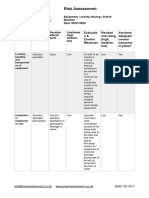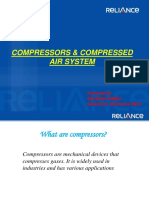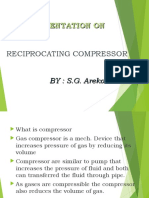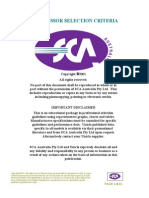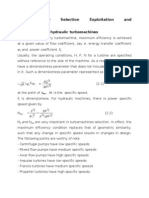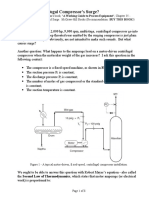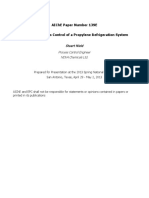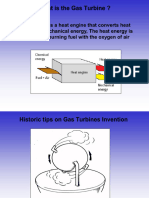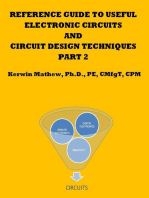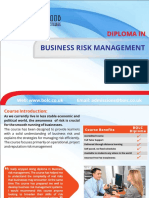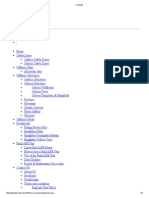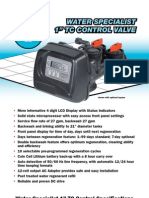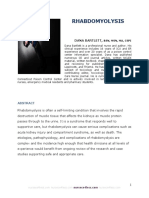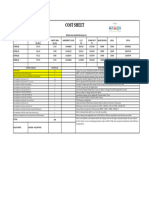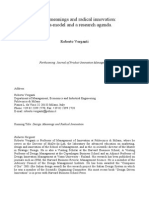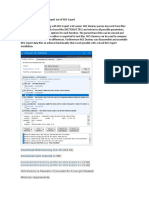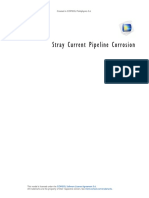Operation Problems Compressor
Operation Problems Compressor
Uploaded by
engineershoaibqaziCopyright:
Available Formats
Operation Problems Compressor
Operation Problems Compressor
Uploaded by
engineershoaibqaziOriginal Title
Copyright
Available Formats
Share this document
Did you find this document useful?
Is this content inappropriate?
Copyright:
Available Formats
Operation Problems Compressor
Operation Problems Compressor
Uploaded by
engineershoaibqaziCopyright:
Available Formats
Compressors & Drivers
Compressor
Types
Dynamic
Centrifugal
Ejector
Displacement
Positive Diplacement
Issues
Control
Seals
EJECTOR CENTRIFUGAL
DYNAMIC
ROTARY RECIPROCATING
DISPLACEMENT
COMPRESSORS
SUCTION
DISCHARGE
MOTIVE
FLUID
EJECTOR CENTRIFUGAL
DYNAMIC
ROTARY RECIPROCATING
DISPLACEMENT
COMPRESSORS
EJECTOR CENTRIFUGAL
DYNAMIC
ROTARY RECIPROCATING
DISPLACEMENT
COMPRESSORS
EJECTOR CENTRIFUGAL
DYNAMIC
ROTARY RECIPROCATING
DISPLACEMENT
COMPRESSORS
EJECTOR CENTRIFUGAL
DYNAMIC
ROTARY RECIPROCATING
DISPLACEMENT
COMPRESSORS
EJECTOR CENTRIFUGAL
DYNAMIC
ROTARY RECIPROCATING
DISPLACEMENT
COMPRESSORS
Axial
EJECTOR CENTRIFUGAL
DYNAMIC
ROTARY RECIPROCATING
DISPLACEMENT
COMPRESSORS
EJECTOR CENTRIFUGAL
DYNAMIC
ROTARY RECIPROCATING
DISPLACEMENT
COMPRESSORS
SUCTION
DISCHARGE
ESTIMATOR CHOICES
Selection Chart
ESTIMATOR - Compressor
Input
Fluid Power Calculation
Fluid Static Head -> approx. 0
Include Piping Frictional Losses of 10 psi per
segment between equipment.
Exchanger Losses per simulation assumptions
Control Valve losses (15 psi for our 500 psig
system - but eliminate if possible?).
Fluid Flow
Efficiency (75% to 80%)
PRO II Output
UNIT 8, 'COMPRESSOR'
FEEDS LP-RECYCLE
PRODUCTS VAPOR HP-RECYCLE
OPERATING CONDITIONS
INLET ISENTROPIC OUTLET
----------- ----------- -----------
TEMPERATURE, C 39.83 254.14 278.88
PRESSURE, KPA 1190.00 39100.00 39100.00
CP/CV 1.2533 1.2627 ACT VAP RATE, M3/SEC
0.1042
ADIABATIC EFF, PERCENT 80.0000
HEAD, M
ADIABATIC 30028.91
POLYTROPIC 31045.39
ACTUAL 37536.13
WORK, KW
THEORETICAL 542.63
POLYTROPIC 561.00
Seals Normally
Limited to 350 F
(180 C)
Compression Ratio
P2 / P1 (absolute pressures)
Not required in our calcs for cost but if
excessive are an indication that a multistage
compressor would be required (usually
confirmed by outlet temperature).
Centrifugal
Compressors and Fans
Performance & Controls
Diff
Press
Inlet Volumetric Flow Rate
Surge
Okay
Centrifugal - Control
For constant discharge pressure systems
(most common). Variations in process flow
rate are controlled through the inlet valve
Inlet Vane Changes
The Flow vs DP
Curve of the
Compressor
Centrifugal - Control
Diff
Press
Inlet Volumetric Flow Rate
Open Inlet Valve
Closing Inlet Valve
Surge Line
Centrifugal - Control
At the point where further restriction in the
inlet valve would cause surging other controls
are required.
Usually
Blow Off
Recirculation
Centrifugal - Control
Blow Off
Blow Off Valve
Disch
Inlet
Blow Off
Centrifugal - Control
Recirculation
Disch
Inlet
Centrifugal - Control
Variable Speed
Used on the smaller compressors for
energy efficiency
Diff
Press
Inlet Volumetric Flow Rate
High RPM
Low RPM
Drives For Pumps and
Compressors
Drives For Pumps and
Compressors
T.E.F.C.
TEFC
Air Flow
seal
bearing
Electric Drives
Enclosures
protected from outside environment
allows free ambient room air to cool windings
drip proof guarded
weather protected
Totally Enclosed Fan Cooled
TEFC most common motor used - isolated from
the free exchange of outside air
Explosion Proof - designed to isolate
surroundings from ignition sources such as
sparking or high temperatures inside the motor
Electrical Area Classification
Performed by electrical and process engineers
Process of classification
identifies processes that have explosion potential
flammable liquids, gases, vapors, combustible dust, or
ignitable fibers or flyings
based on flash point, operating temperature etc.
Identifies distances from process that are safe
identifies equipment and instrumentation
enclosure requirements
i.e. Explosion proof
Our Compressor
What composition we have going through
compressor?
Is the material a fire/explosion hazard (operated
above its flash point) ?
Do we have an explosion potential if it leaks out of
compressor?
What drive type should we choose?
You might also like
- Punch Machine Risk AssessmentDocument5 pagesPunch Machine Risk AssessmentMalayalam musical CollectionNo ratings yet
- Compressor CharacteristicDocument6 pagesCompressor CharacteristicSyedMeherAli100% (1)
- How To ID The Stock Carbs Used On The Kz650Document6 pagesHow To ID The Stock Carbs Used On The Kz650old timerNo ratings yet
- Compressor Troubleshooting: Problem Cause SolutionDocument11 pagesCompressor Troubleshooting: Problem Cause SolutionPatrickioNo ratings yet
- Compressor Selection GuidelineDocument1 pageCompressor Selection Guidelinepradeep1987cool100% (2)
- Centrifugal Compressor System InteractionDocument6 pagesCentrifugal Compressor System Interactionshivajireturns100% (3)
- Compressors & Compressed Air System: Presented by Naushad Ahmad Department: Mechanical MaintDocument48 pagesCompressors & Compressed Air System: Presented by Naushad Ahmad Department: Mechanical Maintnaushadmnnit100% (1)
- Centrifugal Compressor Surge & ControlDocument32 pagesCentrifugal Compressor Surge & Controlejzuppelli8036No ratings yet
- Turbo Machines Lab: Centrifugal and Reciprocating CompressorsDocument38 pagesTurbo Machines Lab: Centrifugal and Reciprocating CompressorsUpendra SravanNo ratings yet
- Cooling SystemsDocument30 pagesCooling SystemsTa Den April100% (1)
- How Liquid Ring Vacuum Pumps Work - EnggcyclopediaDocument3 pagesHow Liquid Ring Vacuum Pumps Work - EnggcyclopediaJAGADEESH100% (2)
- 5-DRY Dry Seal2Document45 pages5-DRY Dry Seal2Dang Xman100% (4)
- Air Compressors: Chapter No: 3Document59 pagesAir Compressors: Chapter No: 3Eric Cook100% (1)
- Volumetric Efficiency of CompressorDocument3 pagesVolumetric Efficiency of CompressorPeshala Gamage100% (2)
- Reciprocating CompressorDocument37 pagesReciprocating CompressorJithin Das100% (1)
- Understanding Centrifugal Compressor Capacity ControlsDocument5 pagesUnderstanding Centrifugal Compressor Capacity Controlsjuancgr77100% (2)
- Multistage Air Compressor FinalDocument21 pagesMultistage Air Compressor FinalJames Thee100% (1)
- Pressurized Mech Seals Piping PlansDocument9 pagesPressurized Mech Seals Piping PlanssachinumaryeNo ratings yet
- Centrifugal CompressorDocument5 pagesCentrifugal CompressorDeliaChia100% (1)
- Chapter 5 Rotating EquipmentDocument32 pagesChapter 5 Rotating EquipmentAeffandii SamawiNo ratings yet
- Question & Answers On Steam Turbines: 1. What Is A Stage in A Steam Turbine?Document114 pagesQuestion & Answers On Steam Turbines: 1. What Is A Stage in A Steam Turbine?tejaswini100% (1)
- Thermofluids & Engine: Gas Power CyclesDocument29 pagesThermofluids & Engine: Gas Power CyclesQim Sv100% (1)
- Centrifugal Compressor Equipment InteractionDocument27 pagesCentrifugal Compressor Equipment Interactionmbabar81100% (2)
- Reciprocating CompressorDocument95 pagesReciprocating CompressorMuhd Rizzuwan100% (1)
- Compressor Selection Criteria: PAGE 1 of 21Document21 pagesCompressor Selection Criteria: PAGE 1 of 21Sabar KumarNo ratings yet
- Turbomachinery Selection Exploitation and MaintenanceDocument9 pagesTurbomachinery Selection Exploitation and MaintenanceMichael Chikwendu100% (2)
- PRESSOR Controls Anti SurgeDocument25 pagesPRESSOR Controls Anti SurgeTrung100% (1)
- PumpsDocument45 pagesPumpsMehmood Ul Hassan100% (1)
- Quick Guide For Pump Selection - EngDocument43 pagesQuick Guide For Pump Selection - EngadelNo ratings yet
- CompressorDocument35 pagesCompressordadrahim0% (1)
- Air and Gas Compressors 14: Rayner Joel, 5 EditionDocument13 pagesAir and Gas Compressors 14: Rayner Joel, 5 EditionJerin Cyriac67% (3)
- Seal Plans Presentation2Document21 pagesSeal Plans Presentation2venkeekuNo ratings yet
- Chapter 7Document62 pagesChapter 7birlieNo ratings yet
- 6natural Gas CompressionDocument46 pages6natural Gas CompressionNana Twum100% (5)
- CompressorDocument22 pagesCompressorSai Krishna Kiran B V100% (3)
- Air Compressors Basic Concepts and ApplicationDocument33 pagesAir Compressors Basic Concepts and Applicationsasat1801100% (1)
- Compressor FinalDocument20 pagesCompressor FinalshihabNo ratings yet
- Compressors & Compressed Air SystemsDocument34 pagesCompressors & Compressed Air Systemsmarzawahed100% (1)
- RefrigerantsDocument33 pagesRefrigerantsArun Raj.MNo ratings yet
- Reciprocating CompressorsDocument6 pagesReciprocating CompressorsNicolas LuchmunNo ratings yet
- Reciprocating Compressor LubricationDocument3 pagesReciprocating Compressor LubricationJiun H TeohNo ratings yet
- Turbo ExpanderDocument17 pagesTurbo ExpanderFathy CaceresNo ratings yet
- CentrifugalandAxialCompressorControlInstructorsGuide 1Document133 pagesCentrifugalandAxialCompressorControlInstructorsGuide 1Abelio Tavares100% (1)
- 4 1-Lat Exceptions To API 614Document5 pages4 1-Lat Exceptions To API 614remsorNo ratings yet
- Centrifugal Compressor CurveDocument6 pagesCentrifugal Compressor CurveMohamed100% (1)
- What Is A Centrifugal Compressor SurgeDocument8 pagesWhat Is A Centrifugal Compressor SurgeMaruthiram100% (2)
- Principle, Operation and Maintenance: PumpsDocument9 pagesPrinciple, Operation and Maintenance: Pumpsmohamedbadawy100% (1)
- Compressors: Me7313 Industrial Automation and ControlDocument13 pagesCompressors: Me7313 Industrial Automation and ControlNuwan DinushaNo ratings yet
- Bhel TrainingDocument41 pagesBhel TrainingArun AroraNo ratings yet
- Questions & Answers On Steam TurbinesDocument58 pagesQuestions & Answers On Steam TurbinesVishal Jaishankar100% (1)
- Automation of Reciprocating Gas Engine Compressor Packages UsingDocument7 pagesAutomation of Reciprocating Gas Engine Compressor Packages UsingGnanaSekar0% (1)
- Advanced Process Control of A Propylene Refrigeration SystemDocument11 pagesAdvanced Process Control of A Propylene Refrigeration SystemCal100% (2)
- Compressive Fan BlowerDocument58 pagesCompressive Fan BlowerKiraNo ratings yet
- Compressor Air Intake Quality ImportanceDocument12 pagesCompressor Air Intake Quality Importanceanup_nairNo ratings yet
- Steam Condensers: 3/28/2015 1 Footer TextDocument23 pagesSteam Condensers: 3/28/2015 1 Footer TextKumari YehwaNo ratings yet
- CompressorDocument63 pagesCompressorRajneesh Patel100% (4)
- 2 CENTRIFUGAL COMPRESSORDocument198 pages2 CENTRIFUGAL COMPRESSORSatish IndiaNo ratings yet
- Gar 11-37Document2 pagesGar 11-37moisesNo ratings yet
- Fans and BlowersDocument27 pagesFans and Blowersjkhan_724384No ratings yet
- Presentation Centrifugal 02.ppsxDocument97 pagesPresentation Centrifugal 02.ppsxEslam Elmadboly100% (3)
- My Turbines Presentation IDocument75 pagesMy Turbines Presentation ImaintenanceNo ratings yet
- Reference Guide To Useful Electronic Circuits And Circuit Design Techniques - Part 2From EverandReference Guide To Useful Electronic Circuits And Circuit Design Techniques - Part 2No ratings yet
- Abdullah Qazi, Grade VF Islamia English SchoolDocument10 pagesAbdullah Qazi, Grade VF Islamia English SchoolengineershoaibqaziNo ratings yet
- Complaint Form Eng2011Document2 pagesComplaint Form Eng2011engineershoaibqaziNo ratings yet
- 73business Risk Management BrochureDocument7 pages73business Risk Management BrochureengineershoaibqaziNo ratings yet
- Floods: CT - Lakshmanan B.Arch., M.C.P. SRM School of Architecture SRM UniversityDocument36 pagesFloods: CT - Lakshmanan B.Arch., M.C.P. SRM School of Architecture SRM UniversityengineershoaibqaziNo ratings yet
- Living Things Non-Living ThingsDocument26 pagesLiving Things Non-Living ThingsengineershoaibqaziNo ratings yet
- MCB Internet Banking - Bill Payment GuideDocument4 pagesMCB Internet Banking - Bill Payment GuideengineershoaibqaziNo ratings yet
- Glossary - TechnipDocument4 pagesGlossary - TechnipengineershoaibqaziNo ratings yet
- 240 Nm3 Per HR - Gas Equivalent - Liquid Nitrogen ConversionDocument1 page240 Nm3 Per HR - Gas Equivalent - Liquid Nitrogen Conversionengineershoaibqazi100% (1)
- Process Data Sheet For Chemical Injection System PU-300A/BDocument2 pagesProcess Data Sheet For Chemical Injection System PU-300A/BengineershoaibqaziNo ratings yet
- Fundamentals of Offshore Field Development - TT112Document4 pagesFundamentals of Offshore Field Development - TT112engineershoaibqazi100% (1)
- Fish SafeDocument4 pagesFish SafeengineershoaibqaziNo ratings yet
- 2618 ws1tcDocument2 pages2618 ws1tcengineershoaibqaziNo ratings yet
- Glossary - SaipemDocument2 pagesGlossary - SaipemengineershoaibqaziNo ratings yet
- Clack ValveDocument10 pagesClack ValveengineershoaibqaziNo ratings yet
- Charactersheet RavenloftDocument3 pagesCharactersheet RavenloftyompwaffleNo ratings yet
- Unit 9 - Present Perfect TenseDocument4 pagesUnit 9 - Present Perfect TenseBICH DANGNo ratings yet
- Rhabdomyolysis: Dana BartlettDocument35 pagesRhabdomyolysis: Dana BartlettYousef JafarNo ratings yet
- Manual Instrucciones Behringer b112d EspDocument17 pagesManual Instrucciones Behringer b112d EspJosé MaríaNo ratings yet
- Opportunity QatarDocument31 pagesOpportunity QatarMona ShahNo ratings yet
- 13 01 2023 - CSE3009 IOT BK WebSocket XMPP DDSDocument14 pages13 01 2023 - CSE3009 IOT BK WebSocket XMPP DDSMann PandyaNo ratings yet
- FreD's Mods Discord RulesDocument4 pagesFreD's Mods Discord RulesAdelin CojocariuNo ratings yet
- Matter Waves: A Moving Body Behaves in Certain Ways As Though It Has A Wave NatureDocument4 pagesMatter Waves: A Moving Body Behaves in Certain Ways As Though It Has A Wave Naturephysics Lover100% (1)
- What Is A Search EngineDocument1 pageWhat Is A Search EngineShyam ChoudharyNo ratings yet
- Switch To e Bill For Free Via Mydigi AppDocument4 pagesSwitch To e Bill For Free Via Mydigi AppAkmar EliasNo ratings yet
- Argument Proposal and Annotated BibliographyDocument3 pagesArgument Proposal and Annotated Bibliographyapi-251855258No ratings yet
- 70. ĐỀ THI THỬ TN THPT 2023 - MÔN TIẾNG ANH - THPT Chuyên Hùng Vương - Gia LaiDocument31 pages70. ĐỀ THI THỬ TN THPT 2023 - MÔN TIẾNG ANH - THPT Chuyên Hùng Vương - Gia LaiPham Thi Vân AnhNo ratings yet
- Excel Dax TutorialDocument151 pagesExcel Dax TutorialRohan Joshi100% (1)
- The Hijaz, The First Islamic State - Malik R. DahlanDocument590 pagesThe Hijaz, The First Islamic State - Malik R. DahlanmoeljadiNo ratings yet
- 37 Grand Stand Cost SheetDocument1 page37 Grand Stand Cost Sheetratansing.jugneNo ratings yet
- Fundamentals of Nursing ReviewerDocument22 pagesFundamentals of Nursing ReviewerDiane QuiamcoNo ratings yet
- Discourse Analysis and English Language Teaching: A Functional PerspectiveDocument12 pagesDiscourse Analysis and English Language Teaching: A Functional PerspectiveFifhi Wulandari0% (1)
- Design, Meanings and Radical Innovation: A Meta-Model and A Research AgendaDocument52 pagesDesign, Meanings and Radical Innovation: A Meta-Model and A Research AgendaAlejandro Rivera-Plata100% (1)
- NCS Dummy Coding ProgramDocument57 pagesNCS Dummy Coding ProgramGabriel Usaga CNo ratings yet
- House Price Prediction Using Machine Learning TechniquesDocument5 pagesHouse Price Prediction Using Machine Learning TechniquesVishal JoshiNo ratings yet
- Portable RN The All-In-One Nursing ReferenceDocument708 pagesPortable RN The All-In-One Nursing ReferenceAnh Vuong100% (2)
- Fourth Year Community Medicine Guidelines 2023Document9 pagesFourth Year Community Medicine Guidelines 2023khichiazanNo ratings yet
- Simulation of Optimized PID With Power System Stabilizer Using MATLABDocument9 pagesSimulation of Optimized PID With Power System Stabilizer Using MATLABJaol1976No ratings yet
- Detailed Lesson Plan in Math 3 SymmetryDocument14 pagesDetailed Lesson Plan in Math 3 SymmetryMichael VillapazNo ratings yet
- 2022 - Cap Carte - Basic Functional Application For Natural Fibers and Types - SlabutaDocument15 pages2022 - Cap Carte - Basic Functional Application For Natural Fibers and Types - SlabutatavibastiNo ratings yet
- Curriculum VitaeDocument12 pagesCurriculum Vitaeapi-250601872No ratings yet
- CP&M - Lec 9 Network, AoaDocument56 pagesCP&M - Lec 9 Network, AoayoyokhanyasirNo ratings yet
- Stray Current Pipeline Corrosion: Created in COMSOL Multiphysics 5.6Document16 pagesStray Current Pipeline Corrosion: Created in COMSOL Multiphysics 5.6Jorge LunaNo ratings yet
